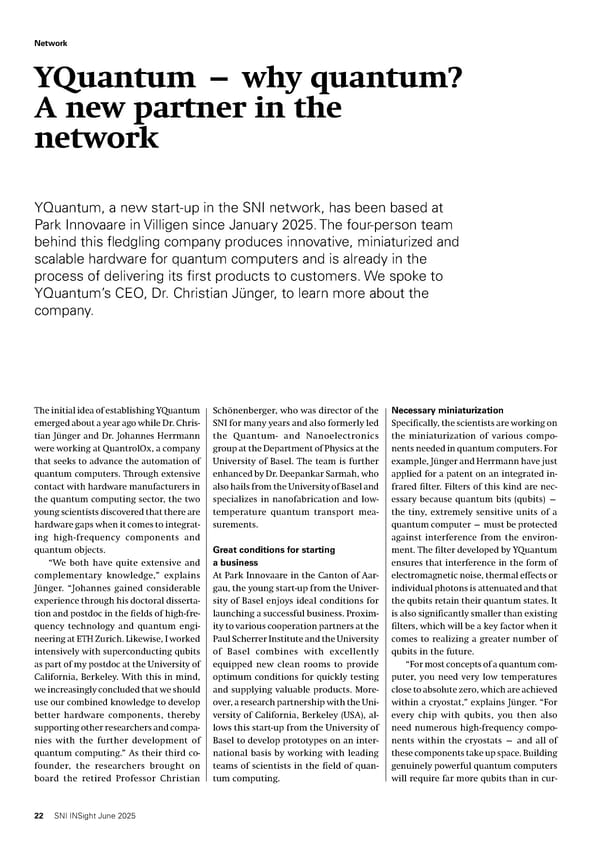Network YQuantum — why quantum? A new partner in the network YQuantum, a new start-up in the SNI network, has been based at Park Innovaare in Villigen since January 2025. The four-person team behind this fledgling company produces innovative, miniaturized and scalable hardware for quantum computers and is already in the process of delivering its first products to customers. We spoke to YQuantum’s CEO, Dr. Christian Jünger, to learn more about the company. The initial idea of establishing YQuantum emerged about a year ago while Dr. Chris- tian Jünger and Dr. Johannes Herrmann were working at QuantrolOx, a company that seeks to advance the automation of quantum computers. Through extensive contact with hardware manufacturers in the quantum computing sector, the two young scientists discovered that there are hardware gaps when it comes to integrat- ing high-frequency components and quantum objects. “We both have quite extensive and complementary knowledge,” explains Jünger. “Johannes gained considerable experience through his doctoral disserta- tion and postdoc in the fields of high-fre- quency technology and quantum engi- neering at ETH Zurich. Likewise, I worked intensively with superconducting qubits as part of my postdoc at the University of California, Berkeley. With this in mind, we increasingly concluded that we should use our combined knowledge to develop better hardware components, thereby supporting other researchers and compa- nies with the further development of quantum computing.” As their third co- founder, the researchers brought on board the retired Professor Christian Schönenberger, who was director of the SNI for many years and also formerly led the Quantum- and Nanoelectronics group at the Department of Physics at the University of Basel. The team is further enhanced by Dr. Deepankar Sarmah, who also hails from the University of Basel and specializes in nanofabrication and low- temperature quantum transport mea- surements. Great conditions for starting a business At Park Innovaare in the Canton of Aar- gau, the young start-up from the Univer- sity of Basel enjoys ideal conditions for launching a successful business. Proxim- ity to various cooperation partners at the Paul Scherrer Institute and the University of Basel combines with excellently equipped new clean rooms to provide optimum conditions for quickly testing and supplying valuable products. More- over, a research partnership with the Uni- versity of California, Berkeley (USA), al- lows this start-up from the University of Basel to develop prototypes on an inter- national basis by working with leading teams of scientists in the field of quan- tum computing. Necessary miniaturization Specifically, the scientists are working on the miniaturization of various compo- nents needed in quantum computers. For example, Jünger and Herrmann have just applied for a patent on an integrated in- frared filter. Filters of this kind are nec- essary because quantum bits (qubits) — the tiny, extremely sensitive units of a quantum computer — must be protected against interference from the environ- ment. The filter developed by YQuantum ensures that interference in the form of electromagnetic noise, thermal effects or individual photons is attenuated and that the qubits retain their quantum states. It is also significantly smaller than existing filters, which will be a key factor when it comes to realizing a greater number of qubits in the future. “For most concepts of a quantum com- puter, you need very low temperatures close to absolute zero, which are achieved within a cryostat,” explains Jünger. “For every chip with qubits, you then also need numerous high-frequency compo- nents within the cryostats — and all of these components take up space. Building genuinely powerful quantum computers will require far more qubits than in cur- 22 SNI INSight June 2025
 SNI Insight - 2025 June Page 21 Page 23
SNI Insight - 2025 June Page 21 Page 23